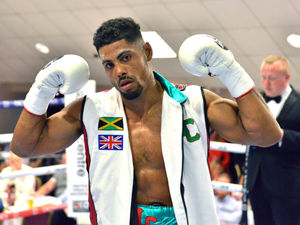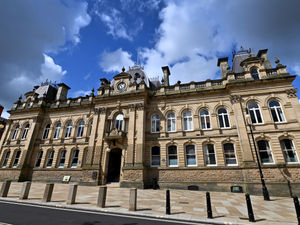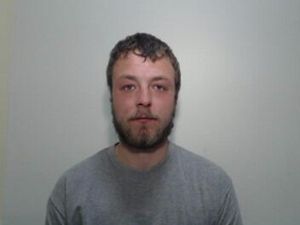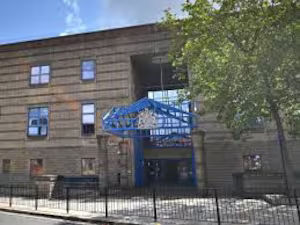'We’re not going to let this carry on': Fight against knife crime in the Black Country
Knife crime is a disease, and it is endemic in Wolverhampton and the Black Country. Time and time again, our front pages show the face of another man or boy whose life has been lost to a knife.
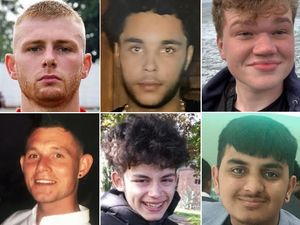
In the last year alone, we have seen the deaths of Zane Smart, Ronan Kanda, Bailey Atkinson, Jack Lowe and Cody Fisher.
These tragedies followed the deaths of Ryan Passey and Reagan Asbury in separate incidents in 2017.
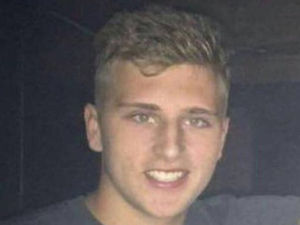
The men and boys who are killed and maimed by knives on the streets of the Black Country are young, but so are the people wielding the weapons.
As we see loss after devastating loss, the fight to turn the tide against knife crime and youth crime in the Black Country is stepping up, but campaigners are urging people to listen when they say that they cannot do this alone.

Today we profile some of the action being taken.
The Way Youth Zone
"Sadly, knife crime has become a common occurrence and teenagers are becoming desensitized to a certain degree. They are now carrying knives for protection as they don’t feel safe.”
Rebecca Bunger is the head of youth work at The Way Youth Zone, a youth centre in Wolverhampton which boasts an impressive array of facilities, from a climbing wall and a music studio to a boxing ring and sensory room.
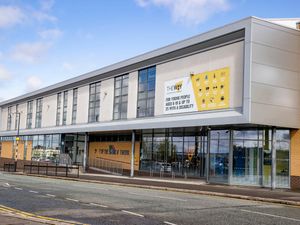
Wolverhampton has been hit heavily by knife crime, and The Way has embedded anti-knife teaching in its practices.
Rebecca said: “At The Way, we recognize this issue and we have safety measures in place such as wanding and CCTV throughout the building to make sure all of our young people can feel safe with us.
“We talk to them regularly about the dangers of carrying a knife and we have started working with West Midlands Police to educate our young people. Our robust safeguarding procedures ensure that any issues or concerns are identified and treated as a priority."
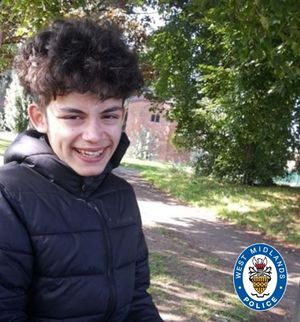
The Way has also been working with Support Futures, a Black Country charity dedicated to encouraging the rehabilitation, education and employability of young people through the medium of sport.
Support Futures has been running its Fit for Futures programme at the way, which combines mental health sessions with non-contact boxing to empower participants and help them into employment or work experience.
Former Black Country councillor Bill Etheridge created the sessions with Support Futures, and said: "There’s a whole lot of talent in the Black Country, but people don’t believe in themselves. Our sessions are allowing people to understand that they can be winners, which is especially important in inner-city areas."
The Wolves Foundation
Molineux is aware of the trouble plaguing its city, and Wolves is using its own charity, the Wolves Foundation, to work with young people in Wolverhampton.
The foundation has a two-pronged approach, working on the one hand to empower young people and encourage them to make the right choices, while on the other, going out into the community and de-escalating potentially violent scenarios.
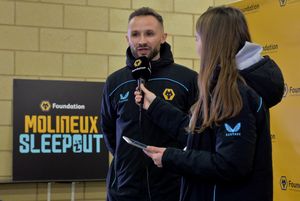
Foundation senior manager of projects Tom Warren said: “The foundation is focused on the needs of the community, and we work with other local partners including the local authorities, police, and the NHS to gather data about those issues.
“Obviously knife crime is an ongoing issue in the city. From our perspective, we’re using the power of the club and our brand to educate.”
The foundation works closely with the West Midlands Violence Reduction Partnership, which funds it for an array of different projects and help it to deliver youth outreach initiatives.
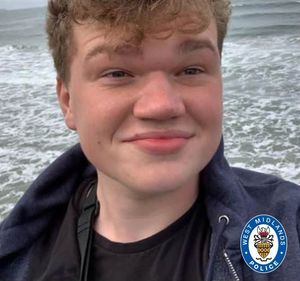
Tom added: “A lot of our staff are from the city and from areas which are hotspots for violence. Our stadium is next to Whitmore Reans which has big issues with this.
“Having staff that are from these areas means that people can associate with and see them as real mates, so we can educate them about better alternatives.
“It’s prevention not rehabilitation. We educate these people when they’re younger and give them the knowledge, an understanding of what causes violence and these issues.
“What’s important is we have to understand the reasons why, and not just say ‘don’t carry knives’. We have to get to the root cause, not just telling them they can’t carry them, because the punishment is not as much of a deterrent as you expect it to be.

“So much of the work we do is tackling the reasons why young people carry knives, and we can educate on that to tackle the reasons why.
“There’s not one answer, there are lots of different answers and there isn’t a wrong one.
“For some it’s protection, for others it’s the influence of social media or trying to look cool. There are lots of reasons why and we have to educate young people on the dangers of carrying knives and why they shouldn’t carry them.”
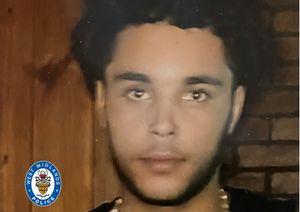
As well as educating young people, the Wolves Foundation has staff on the streets of Wolverhampton, specifically located in hotspot areas of violence so they can attempt to de-escalate any potential fights or attacks.
Through its Step Together programme, which is funded by the West Midlands Violence Reduction Partnership, youth workers are placed in busy areas such as Blakenhall, Heath Town and the city centre, where pupils commute to and from school.
Tom said: “We’re in hotspot areas of the city where there’s a real high prevalence of crime, at hotspot times such as evenings and weekends.
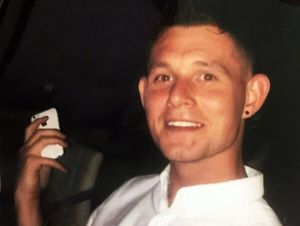
“We have staff on the streets being a friendly face that people can talk to, and can de-escalate situations when they need to.
“If there has been knife crime, it’s usually come from something else that’s happened before that, such as a fight in school earlier in the day.
“So where will the kids go after school? The bus station. It’s often a melting pot with kids from different schools, and when you put these kids together, it can flare up.
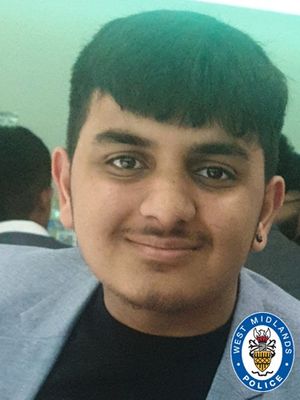
“We have four staff members in the bus station after school every single day and de-escalate, acting as a bridge between kids and the police.”
While the police might appear to be the front line response to the war on knife crime, it is important to acknowledge that many people of all ages might be reluctant to engage with them.
Tom added: “The police do a lot of good things, but they’ve got quite a negative reputation for what they do. We work with them closely to prevent crime. It’s a partnership with police and the schools, and we hope we use our brand so people listen to us and we can help these kids.”
The James Brindley Foundation
Mark and Beverley Brindley have endured what no parents should ever have to - losing their child to knife crime.
Their son, James, was stabbed in the heart just 400m away from his parents' house in Aldridge, after talking to his girlfriend on the phone.
Since then, there have been endless tragedies across the region as a result of knife crime, with young men losing their lives to senseless violence.

"It gives us flashbacks to nearly six years ago,” Mark said. "Those flashbacks can be triggered by the language used in the media and it becomes overwhelming, but we just have to keep going.
"The biggest thing by far is getting people generally to understand that they do have a role to play and it starts with their own children.
"Then it gets wider, to members of their family and the local community, people in the streets.
"It will take that to turn the tide for society to say no, we’re not going to let this carry on. We’re going to stop it. It’s a huge commitment.”
Mark has been campaigning for social and legal changes to the system in a bid to stop anyone else losing their life the way his son did.
One of the James Brindley Foundation’s biggest campaigns is to install 12 knife bins around Walsall, so people can surrender any weapons they have without fear of legal repercussions.
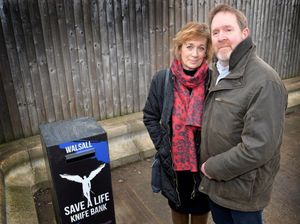
Mark said: “It came to my attention back in December that Walsall has currently just one knife bin, and it’s located in the middle of Walsall not very far away from Tesco.
“So when I realised that we still only have one knife bin, I was shocked because of the continuing rise in serious youth violence, not just in Walsall, but generally. It’s still a problem that is increasing, it’s not flattening off, it’s not decreasing.
“So given the size of the borough - and Walsall is a big borough - anybody wanting to safely and legally dispose of a bladed weapon would have to travel quite some distance to that bin.
“I’ve heard on occasion of people being stopped on their way to a knife bin and facing the possibility of prosecution, because they have an offensive weapon about them.
“So it seemed to me that the sensible thing to do is to have that facility of a knife bin local to communities, so that the travel and the time taken to do that, that the risk is greatly reduced, it’s made so much easier. You know some people don’t have cars, some people have to rely on public transport, and so on.
“That was the motivation initially, that was a knee jerk reaction from me. We’ve got to make it as easy as we can for people to dispose of these knives, because knives in a bin are much safer than knives in a pocket.
“If somebody is armed with a knife, they’re more likely to become violent. If you don’t have a weapon about your person, you’re less likely to become violent.”
While Mark is passionate about the importance of having ample knife bins in communities, he also knows that there needs to be ample communication, in particular, with young people.
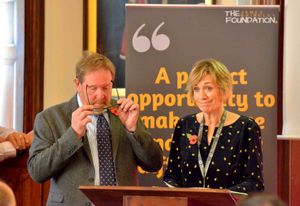
"The idea we have with our bins will be that it’s an opportunity to communicate with local communities, and particularly young people. The Safer Streets hashtag is all about local people saying to us where they don’t feel safe and when they don’t feel safe and why they don’t feel safe and what could be done to make them feel safer," he said.
"So on the top of our bins will be QR codes which link to our website to anonymous forms and we will collect that data and it will direct activities into the future to help make our community safer.
"But the other strand to that is encouraging young people to talk to us, because we’re not a figure of authority. And obviously we’re not the police. We’re not the Police and Crime Commissioners Office, we are just a charity doing work with young people directly.
"And we value their input, because it’s the young people who are mostly affected by this disease we all know is knife crime. The other strand to the Safer Streets campaign is reaching out to young people to communicate with us, get involved with us, anonymously if they wish to and again, there’ll be an anonymous form on our website that they can complete.
"And we know people, young people, do want to be part of the solution. And they have lots of ideas and input that we want to use constructively to help the community immediately around Walsall. So that’s that’s what the knife bins are about.
"It’s about reaching out. It’s about making people aware of us as an organization, that they can talk to us without prejudice. And we believe we can help them. And where we do have direct interventions with young people, our success rate is exceptional."
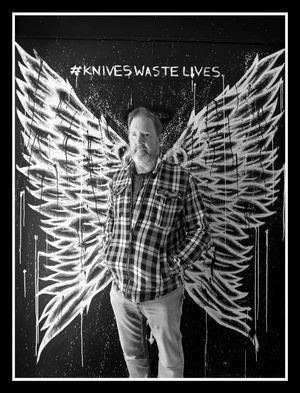
The James Brindley Foundation has a We're Listening Campaign, through which young people can open up about issues which are troubling them.
Mark believes this is vital, especially for people who do not trust authority figures such as police officers.
He said: "I have to say that there are a lot of young people who are disenfranchised from education and from society as a whole.
"And unfortunately, they don’t trust authority figures and the police is one of those authority figures that they’re suspicious of and they’re alienated from.
"So they will talk to us, they will open up to us in circumstances when they won’t open up to the police, and they won’t open up to their teachers.
"Currently, our organization has young people referred to us, either by schools or the police, or youth justice services and Children’s Services.
"We want to reach out to young people directly as well. Again, that was the reason for the QR code on the top of the bins, giving them that opportunity, letting people in local communities know we’re here in Walsall.
"That listening is directed at young people who would like to talk to us about what they think about knife crime, knife carrying, and what the solutions could be."
In regards to the motivation behind carrying a knife, Mark said: "I think there’s a number of reasons. I think there’s a fear that everybody is carrying knives. And that just simply isn’t true.
"But I would say more people are carrying knives than they were not very long ago. There’s a fear on the streets, that if they were attacked and they didn’t have a knife on them, they feel they should carry a knife as a means of self-defence.
"Although the reality is if you’re carrying a knife, you’re more likely to resort to violence than if you weren’t. There’s an awful lot of county lining, and you know that is the exploitation of young people who have been manipulated into working for gangs. So you know, that’s another motivation.
"In some parts of communities, it is considered normal. And in some parts, it’s actually considered, I wouldn’t say a cool thing to do, but I think it appeals to the machismo of certain young people.
"They feel empowered and involved. There’s the criminality aspect and then there’s the trend aspect, and impressing other people."
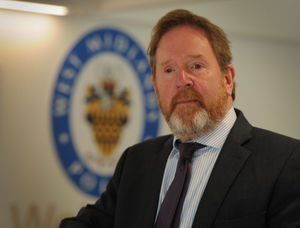
To anyone carrying or thinking of carrying a knife, Mark said: "Don’t do it. If you’re concerned about walking on the streets, choose times when you might feel safer.
"And pick up the phone, pick up the phone to somebody you trust and that could be the James Brindley Foundation. We can help, we have the Full Circle programme, where we’ve been involved with young people who are knife-carrying, and have affiliations with gangs.
"They’ve felt able to move away from those gangs. And where young people have been excluded or they’re not attending school or education, what have you, we’ve turned that around as well.
"We have the ability to help young people and understand their predicaments and give them the facts and educate them away from the violence and the potential for criminality, and helping them to get into sociable activities, pastimes, sports, music, performing arts, and what have you, is all part of the program in diversionary tactics to help young people put that behind them.
When asked what should change regarding social attitudes to knife and youth crime, Mark said: "First of all, it starts with attitude. And I think that there is an attitude still that people think it can’t happen to my child, we live in a nice area, we don’t live in an inner city. So it’s not going to happen to us.
"But we know that it can and my son’s murder was proof of that. And many other around the country. So the attitude has to be that if we don’t all take ownership of this problem, then we’re not going to be able to turn the tide.
"It’s not somebody else’s problem. It’s everybody’s problem. Everybody has a role to play.
"And that means that the Government’s role is obviously crucial, and giving long-term funding for the solution of a long-term problem, because this has been going on for many, many years now. The funding comes in 12-month or two-year tranches and that means that the solutions are cut short before they’ve had time to really work.
"So you know, from a government perspective we need a long-term funding commitment. And from a societal point of view, for everybody in a community to look out for those around them who are vulnerable.
"And for parents, it means watching for changes in behaviour and changes in mood of their young children and being able to have difficult conversations with their children. Because youth violence is not inevitable and it is preventable and it does start in the home but it also continues in school.
"There has to be that uniform commitment from all schools, not just the few who are taking it seriously. Every school needs to take it seriously. Whether they believe they have a problem or not.
"They might not even know about the problem, because there are kids who work under the radar, and they might not even know that.
"But anybody, any parent who doesn’t quite know how to start that conversation with a young person, because they found a knife in their jacket pocket or in a bag, they can go on our website.
"And one of the campaigns is Knife or Life, and that’s on our website, and it gives advice on how to have those conversations with their children, and anybody who needs help on a one to one basis, they can pick up the phone to us."


